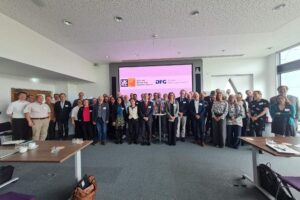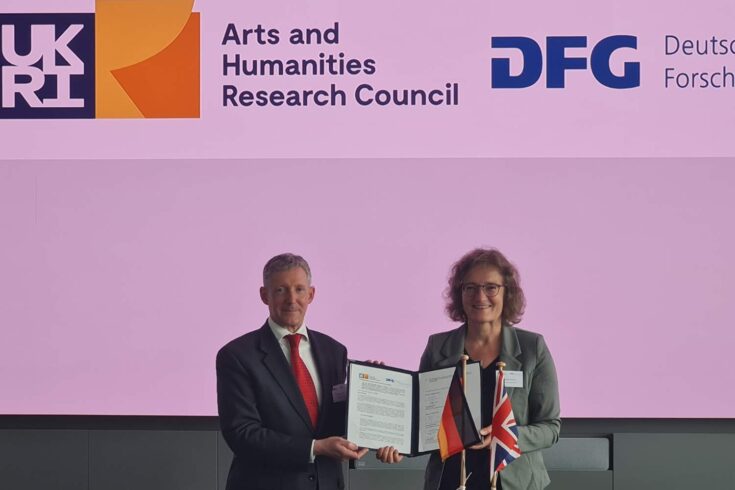The signing of this agreement extends the Arts and Humanities Research Council’s (AHRC) longstanding partnership with Deutsche Forschungsgemeinschaft (DFG) for a further five rounds starting in October 2026.
This will foster new opportunities to combine the strengths of world-leading arts and humanities researchers in the UK and Germany and to explore questions that improve our understanding of the world.
The partnership will continue to focus on UK and German joint discovery research projects through annual funding opportunities that are open to the entire spectrum of the arts and humanities, covered by the remits of AHRC and DFG.
Funding world-class arts and humanities research
This international collaboration has facilitated high quality research across a wide range of disciplines within arts and humanities.
The AHRC and DFG bilateral programme has funded over 110 projects and continues to demonstrate uniquely high sustained levels of demand from academic communities in both the UK and Germany.
To date, the programme has received 666 applications across the six rounds.
The programme provides a unique opportunity for discovery led research which contributes to all AHRC objectives and facilitates access for UK researchers to the European research and innovation ecosystem.
AHRC Executive Chair, Professor Christopher Smith, said:
AHRC and DFG are celebrating over 100 funded projects from our bilateral programme.
The value and significance of partnership lies in the quality of our research and the importance of our partnerships.
This pursuit of collaborative scholarship symbolises the determination of our countries and citizens to stand side by side in facing the future, committed to peace, prosperity and the flourishing of all humanity, and exemplifies how science can help achieve those shared and vital ambitions.
A legacy of cutting-edge collaborative research
The research funded by AHRC and DFG collaboration has resulted in:
- new scientific discoveries
- research publications
- exhibitions
- a variety of educational resources
- research databases
- new UK and German cultural and creative sector partnerships
The impact of early fishing practices
Research from Durham University and Johannes Gutenberg University of Mainz has used new imaging methods to discover the oldest engravings of fishing in Ice Age art, revealing 15,800-year-old engravings of catching fish in traps.
Discoveries that not only deepen our understanding of palaeolithic diets and the symbolic importance of fishing, but also provide insight into the social practices of early hunter-gatherer societies.
Memory preservation
Research at the University of Stirling and Osnabrück University is the first of its kind to encourage residential workers and foster carers to think about memory preservation.
Researchers have established an interactive online tool to preserve the childhood memories of children and young people in foster care or residential homes.
The hope is that the tool can be replicated across the care sector.
Sign language meanings
Research at the University of Birmingham and University of Cologne has broadened our understanding of how signs and their multiple meanings are understood by deaf children.
Leading to new interventions for deaf children who are learning to sign as their first language and cognitive maps for deaf people to explore conditions such as Alzheimer’s disease and dementia.
Robotics and artificial intelligence
Researchers at Goldsmiths, University of London and University of Konstanz are working at the cutting edge of how robotics and artificial intelligence will transform and enhance creativity while ensuring the centrality of human experience.
Diverse disciplines
Other projects span disciplines as diverse as linguistics, archaeology and music.
New projects from January and February 2025, that were funded through the most recent round, will interrogate subjects as varied as:
- the technology of touch
- toxic heritage
- educational mobility across western Europe
Impactful international collaboration
This partnership forms part of AHRC and UK Research and Innovation’s (UKRI) longstanding support for world-leading international research.
As part of the bilateral programme, the research will continue to bring the UK’s and Germany’s world-class arts and humanities researchers together, with a mutual objective to tackle issues that demand a collaborative approach to making fundamental advances in human knowledge.
In doing so, it will contribute to AHRC and UKRI’s mission to invest in collaborative research that helps to maintain a thriving, inclusive research and innovation system across the world.

AHRC and DFG teams meet to extend bilateral funding agreement. Credit: AHRC
A strengthened research culture
So far, the programme has funded grants for a variety of arts and humanities projects and attracts applications of the highest quality from both countries, highlighting its extensive and continued appeal.
In the past seven years, the collaboration has also deepened and strengthened cooperation between UK and German researchers leading to the growth of a transnational UK-German research culture.
Outcomes for the seventh round of the bilateral programme will be announced in November 2025.
The eighth round will open for applications in October 2025 and will close for applications in February 2026. Subsequent annual rounds will follow the same monthly pattern.

